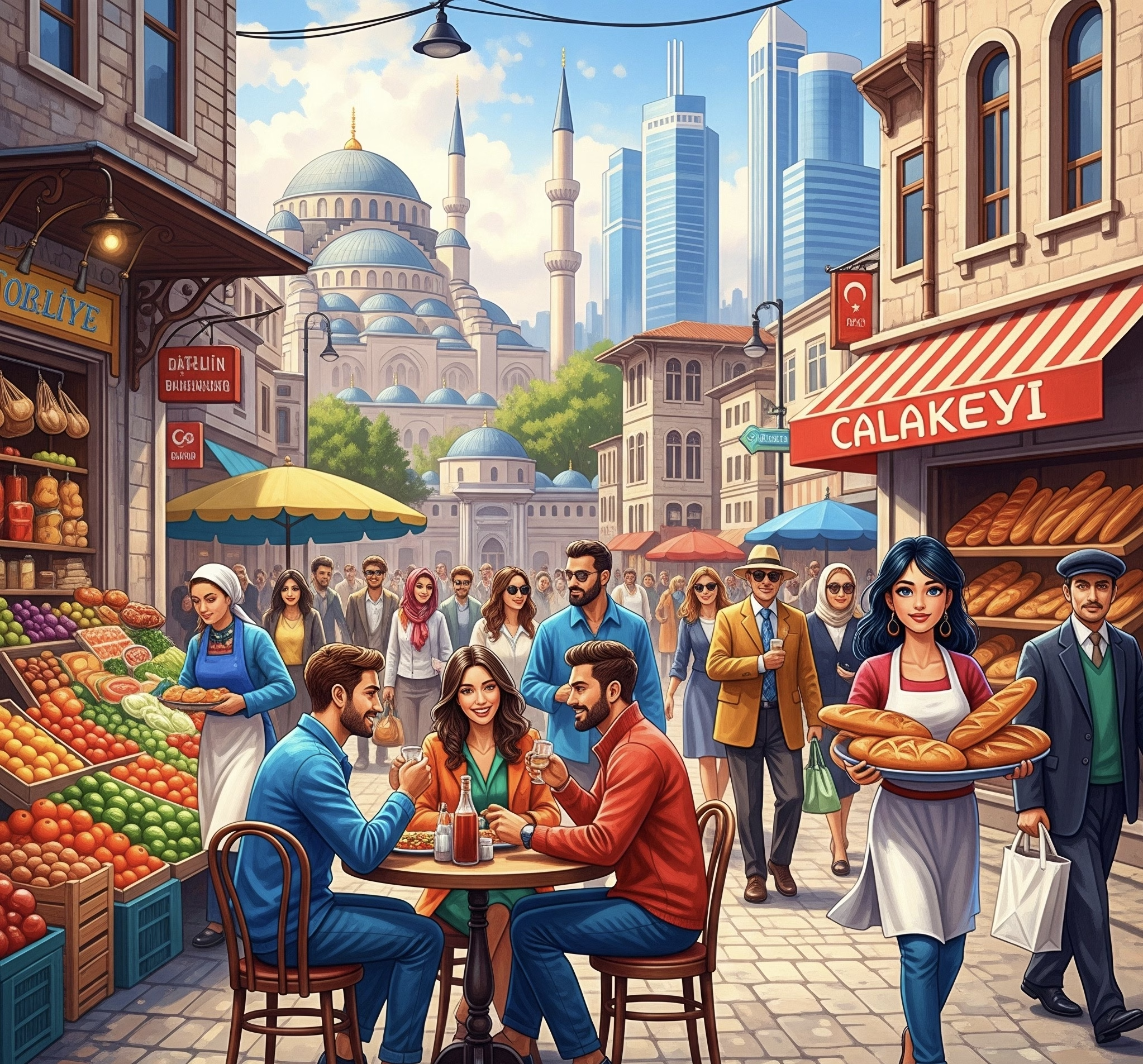
Daily life in Turkey
Daily Life in Turkey: What to Expect (and Laugh About)
So, you’ve landed in Turkey — lured by the beaches, the baklava, or perhaps the curious appeal of chaotic traffic patterns. You’re not alone. Thousands of expats choose to start a new chapter here, but what is daily life in Turkey really like?
This is your ultimate (and slightly tongue-in-cheek) guide to daily life in Turkey. Let’s dive into the magic, the misadventures, and the everyday moments that make this country one of the most surprising and endearing places to live.
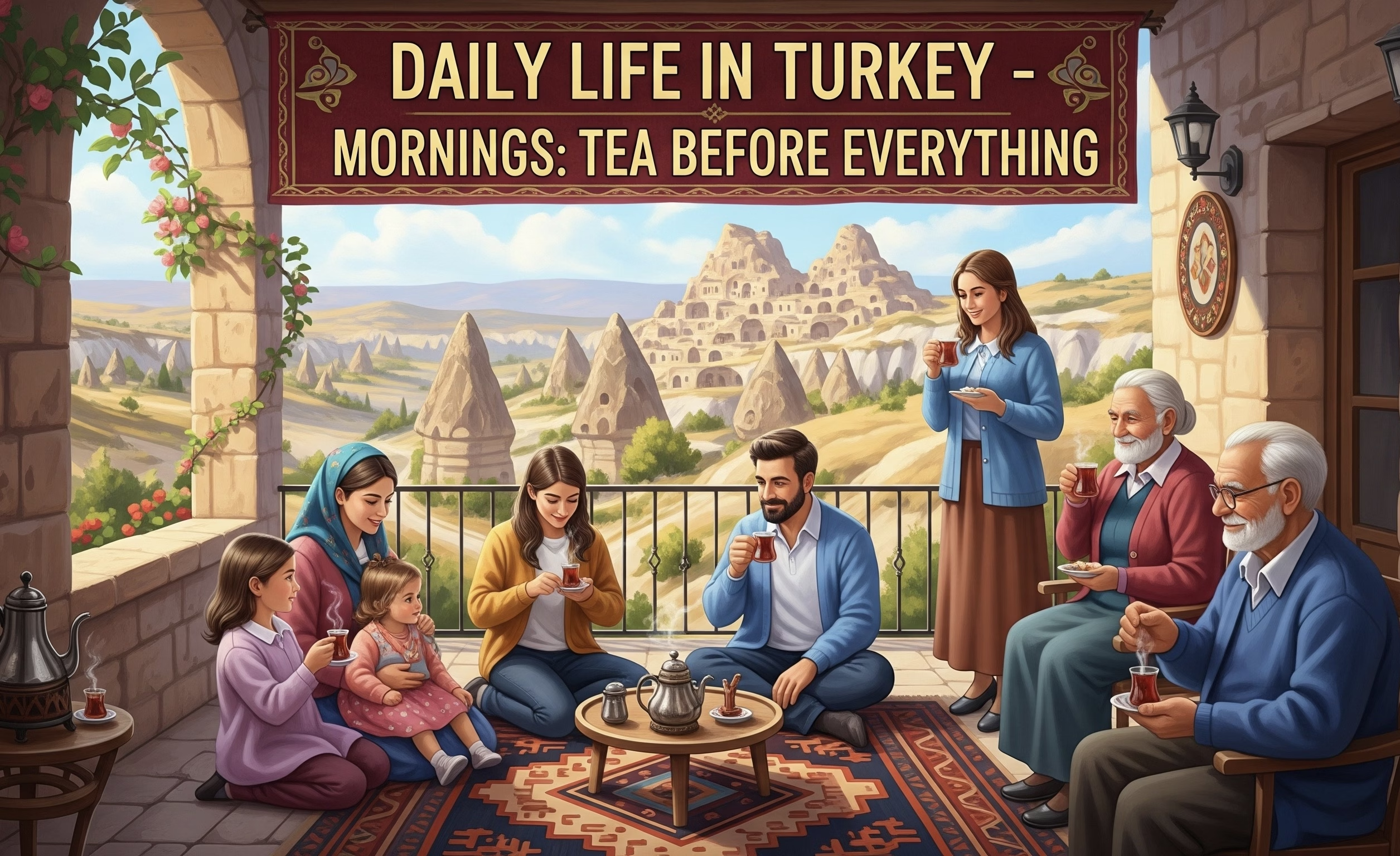
1. Mornings: Tea Before Everything
Forget your artisanal oat milk cappuccino — in Turkey, mornings begin with çay. That strong, tulip-shaped glass of black tea isn’t just a drink; it’s a ritual. Street sweepers drink it, bank clerks drink it, and you’ll drink it too (willingly or by polite force).
Bonus tip: Never say no to tea. You might accidentally offend three generations of a family and miss out on gossip, politics, or the best place to buy olives. And if you’re lucky, you’ll end up debating world affairs with your local baker while eating fresh simit.
Also: breakfast in Turkey is not just a meal. It’s a political statement. It’s a social gathering. It’s also the reason people are late for work on Sundays.
The Turkish breakfast spread — called kahvaltı — is a glorious table of cheeses, olives, tomatoes, cucumbers, eggs, jams, honey, clotted cream (kaymak), and more bread than any one person could ever consume. It’s communal, it’s endless, and it’s the national weekend hobby.
Even in cities, cafés open early to serve traditional breakfasts — and some stay open late, offering it all day. It’s not unusual to have brunch at 4 p.m. in Turkey. You’ll discover local favorites like menemen (scrambled eggs with tomato and pepper) and sucuklu yumurta (fried eggs with spicy sausage).
And if you’re short on time? A simit (Turkish sesame bagel) grabbed from a street vendor, paired with a tea in a paper cup, will fuel you until lunch.
The morning ritual in Turkey sets the tone: unhurried, flavorful, and very much about connecting — with others, with food, and with the day ahead.
2. The Soundtrack of the Day
Turkey sounds like nowhere else on earth. If you listen carefully, you’ll hear a country alive with layers of life: the call to prayer echoing over rooftops, the rhythmic rattle of a simit seller’s cart, the excited honk of a wedding convoy, and the multilingual murmur of daily hustle.
Five times a day, the ezan (call to prayer) floats from the minarets. Even in busy cities, the moment provides a brief collective pause. Whether or not you’re religious, the echo of voices from minarets — each with its own timing and melody — becomes a comforting part of your daily rhythm.
Next, there’s traffic. And with it, horns. Car horns in Turkey are not just warnings — they’re greetings, reminders, and occasionally, musical instruments. One honk means “Move.” Two honks mean “I’m here.” Three quick taps might be “Hey, neighbor!” It’s symphonic chaos.
Street vendors, especially in older neighborhoods, contribute a soundtrack of tradition. You’ll hear:
- “Siiiimit!” (fresh bread rings)
- “Eskici!” (the junk man collecting old goods)
- “Bozaaa!” (a winter fermented drink seller)
- And the classic: a guy pushing a cart yelling only “Patates!” for potatoes
Sometimes you’ll hear the crackle of a loudspeaker announcing lost keys or local political events, followed by applause or barking dogs. Markets, meanwhile, hum with negotiating voices and the tap of calculators. Dolmuş minibuses have drivers who yell out routes like auctioneers, while their vehicles rattle to life with a background of 90s Turkish rock.
Throw in the blend of contemporary pop, Turkish arabesque, and 90s Eurodance wafting from cafes and taxis, and you’ve got a daylong playlist that’s unpredictable and weirdly satisfying.
Even the animals participate. Cats meow with operatic drama, and the occasional rooster or dog chorus reminds you that rural life is never far away.
The true surprise comes at night when things don’t fully quiet down. Fireworks for weddings. Celebratory honks after a soccer victory. And occasionally, the call of a neighbor offering “kestane” (roasted chestnuts) from their balcony.
By bedtime, you’ll realize: the sound of Turkey isn’t noise. It’s personality. It’s motion. It’s a country telling its story — out loud, every day.
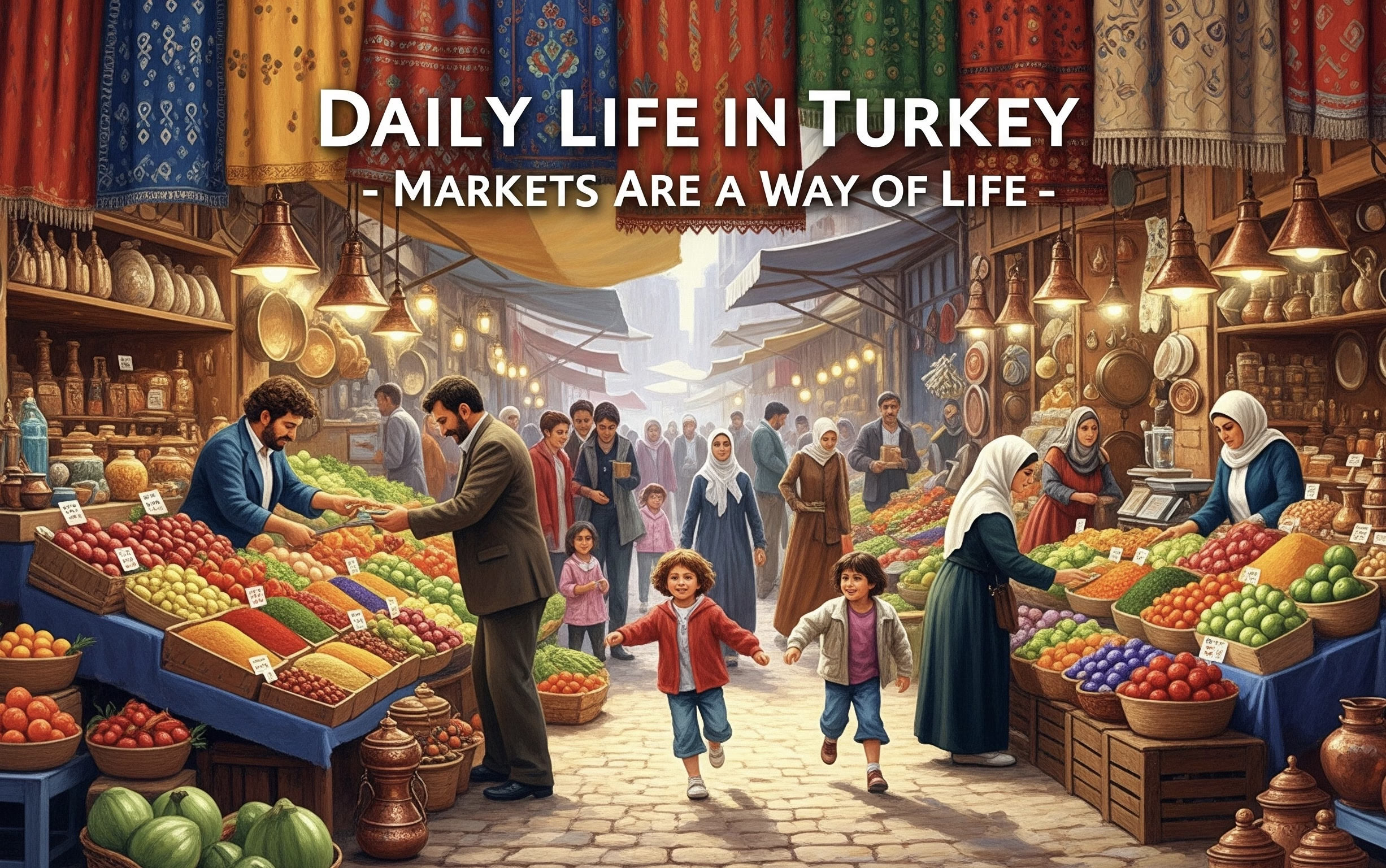
3. Markets Are a Way of Life
In Turkey, markets — or pazars — are more than just a place to buy tomatoes. They are bustling arenas of color, sound, and human connection. You’ll find them once or twice a week in nearly every neighborhood, and each visit is an adventure.
You go for some lemons, and leave with:
- A watermelon the size of a small ottoman
- A 12-pack of cleaning cloths
- A mysterious herb gifted to you by an old woman who insists it “cures everything”
The atmosphere is part farmer’s market, part street theatre. Vendors shout prices with opera-worthy projection. There’s laughter, bargaining, and the sound of rustling plastic bags blending with the occasional accordion melody.
Each stand has its own rhythm — the egg guy taps each carton for show, the cheese man cuts generous samples for every customer, and the olive lady knows everyone’s favorite mix by memory.
Don’t forget:
- Always haggle (politely) — it’s part of the experience.
- Bring cash — small notes preferred.
- Get there early for produce, later for discounts.
You’ll quickly learn some of the vendor lingo — “abi sana bugün özel” (brother, today’s special just for you) — and be adopted by a favorite stall owner who throws in free herbs with every visit.
Some pazars are themed: organic-only, textiles, antiques, fish. You might stumble upon the Friday market in Fethiye with its garden-fresh herbs and bundles of wild greens, or Istanbul’s massive Kadıköy market, which feels like a gourmet maze.
Many locals treat market visits as social outings. It’s where you bump into neighbors, sip a tea at the mobile çay stand, and debate which tomato is best for menemen.
Even in tourist areas, the market is where locals and expats mix naturally. Bargaining is an art — part economic, part flirtation. A successful haggle ends with a laugh and a mutual “kolay gelsin” (may your work be easy).
These markets aren’t just functional. They are cultural experiences, social hubs, and reminders that shopping can still be personal, animated, and — dare we say — joyful.
You’ll come to look forward to market day not just for the groceries, but for the conversation, the community, and the celebration of food in all its glorious abundance.
4. Getting Around (or Not)
Transportation in Turkey is many things: efficient, entertaining, unpredictable, and occasionally the cause of colorful vocabulary in multiple languages. Whether you’re commuting in Istanbul or navigating a rural town, movement here comes with character.
Dolmuş: The Shared Ride Experience
Dolmuş (pronounced “dohl-moosh”) are shared minivans that run fixed routes but with flexible stops. You hop on, pass your fare to the front (even if you’re in the very back), and say where you’re going. The driver calculates the fare in their head, never looks at change, and somehow always knows exactly who paid what.
Rules:
- There are no exact timetables — they leave when full.
- Expect to squeeze — personal space is optional.
- If the driver knows you’re foreign, expect extra conversation or music choices curated just for you.
Metro, Tram, and Ferry (Istanbul’s Transport Symphony)
In big cities like Istanbul, Ankara, and Izmir, the public transport system is well-developed:
- Metro: Fast and modern.
- Trams: Great for short distances.
- Marmaray: An engineering marvel — it crosses continents under the sea.
- Ferries: The most scenic ride in the city, with seagulls begging for simit and passengers sipping tea.
You’ll need an Istanbulkart or the equivalent transit card. Just tap and go — it works on nearly everything short of a camel.
Buses: Intercity Beasts
Turkey’s intercity bus system is legendary. Comfortable, punctual, and with in-seat entertainment that occasionally includes pirated movies and nationalistic music videos.
Expect:
- A steward (yes, really) who hands out tea and wet wipes.
- Frequent breaks at roadside diners that sell everything from soup to socks.
- Random seatmates who might become lifelong friends — or sleep the whole way.
Taxis: Talk First, Ride Later
Taxis are plentiful and cheap compared to Western prices, but require caution. Always:
- Use official yellow taxis with a meter.
- Ask for the meter to be turned on.
- Download a taxi app like BiTaksi to avoid confusion.
Small towns are simpler — the driver likely knows your landlord. But in big cities, you’ll learn the art of polite negotiation, confident tone, and an occasional shrug of surrender.
Traffic: A Sport, Not a System
Driving in Turkey? Brace yourself. Indicators are rarely used. Roundabouts are battle zones. And parking is… interpretive.
Yet somehow, it works. Pedestrians weave through lanes, scooters defy gravity, and buses bend physics. It’s chaotic harmony.
Bonus: The horn has many meanings — anger, greeting, reminder, celebration. Learn the horn dialect and you’ll be fluent in a new cultural language.
Whether you’re commuting, road-tripping, or simply people-watching from a ferry, transportation in Turkey is never dull. It’s motion with personality — and occasionally, a free concert.

5. Bureaucracy and Bills
Ah, Turkish bureaucracy. A rite of passage. A cultural institution. A test of patience, willpower, and your ability to survive without screaming in a waiting room. If daily life in Turkey had a boss level, this would be it.
Welcome to Paperwork Land
The phrase “you need to get this stamped” will haunt your dreams. But let’s break it down into reality:
- Residence permits: You apply online, then go to the Göç İdaresi (Immigration Office), but only after getting your documents translated, notarized, and blessed by your landlord and maybe your dentist.
- Tax number: Needed for everything — from opening a bank account to buying a SIM card. You’ll get it from the local vergi dairesi (tax office), ideally before you lose your mind.
- Electricity, water, internet setup: Requires copies of your rental contract, passport, and sometimes a DNA sample (just kidding… mostly).
Pro tip: Always carry extra photocopies, passport photos, and your sense of humor. The one time you don’t, someone will ask.
Bill Paying in Turkey: An Olympic Event
Turkish bills (faturalar) have their own ecosystem. They don’t come by post as much anymore — instead, they’re texted to you, posted online, or shouted out your window by the neighbor’s cousin who works at the municipality.
Here’s how people pay:
- PTT (Post Office): The old-school option. You take a ticket, wait in line behind someone opening a pension account for their goat, and finally pay your bill.
- Bank apps: Modern and fast — if your Turkish is up to the task and your app doesn’t crash.
- Automated kiosks: These are great… until you realize you can’t read the buttons and accidentally pay your neighbor’s water bill.
- In person: Some folks still take their rent (in cash) to the landlord’s uncle’s barber shop on Tuesdays. Tradition matters.
The Queue: Where Souls Go to Reflect
The Turkish queue is not linear. It’s a living, breathing mass of polite pushing and strategic elbowing. You’ll quickly learn:
- There are invisible rules about who gets to cut.
- Elderly people get priority. Mothers with babies get ultra-priority. Confident grandpas with newspapers get absolute power.
- If someone asks, “Who’s last?” — say “I am” unless you want a duel.
The Secret Weapon: “Ahmet Bey”
At some point, you’ll be told, “Talk to Ahmet Bey.” Every office has one. He is the fixer. The knower of all forms. The king of staplers.
Find him. Be kind. Bring sweets. Ahmet Bey can turn your 5-day problem into a 5-minute miracle.
Common Bureaucratic Quests
- Changing your address: You must inform the nüfus müdürlüğü (population registry) within 20 days — or risk angry letters and confused neighbors.
- Renewing your ikamet (residence card): Requires all the original documents again, plus new biometric photos. Yes, even if you look the same.
- Getting a SIM card: You need your passport, your tax number, and 45 minutes to hear every mobile plan under the sun — in Turkish.
Laugh or Cry?
At some point, you’ll spend four hours in a municipal building to get one signature, only to learn the person in charge “is at lunch.” Until 3:00 p.m.
Then they come back, smile, stamp your paper with incredible satisfaction, and offer you tea.
That’s Turkish bureaucracy in a nutshell: frustrating, charming, and weirdly endearing — like a slow-motion dance that you eventually learn the steps to. not just for the groceries, but for the conversation, the community, and the celebration of food in all its glorious abundance.
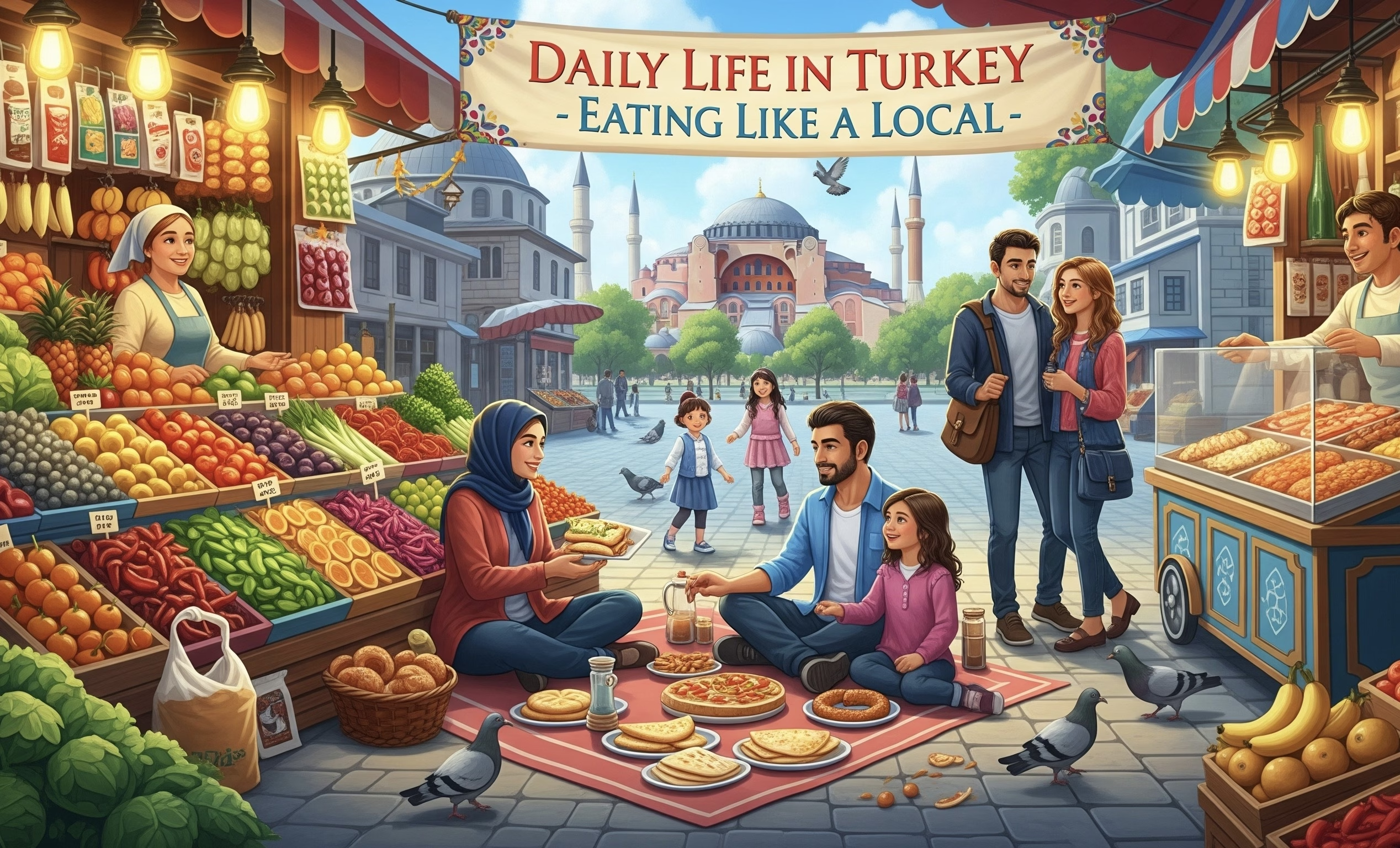
6. Eating Like a Local
Meals in Turkey aren’t just about nutrition — they’re about culture, connection, and generous portions. Food is central to everything. Visiting friends? You’ll be fed. Need a plumber? He’ll likely offer tea and cake. Even the cable guy might share a simit while updating your modem.
Breakfast: A National Event
Kahvaltı is the breakfast ritual of champions. Expect a full spread of olives, white cheese, tomatoes, cucumbers, honey with clotted cream (kaymak), boiled eggs, fresh bread, and various jams. Tea is non-negotiable. Turks take breakfast so seriously that some cafes offer it all day.
Lunch: Light or Lavish
Lunch may be a quick döner or tavuklu pilav (chicken with buttery rice) or a sit-down meal with soup, salad, and mains — always with bread.
Dinner: A Social Feast
Dinner is often late and deeply social. Expect shared dishes, long chats, and possibly raki and live music if you’re at a meyhane.
Street Food & Sweets
-
Simit, midye dolma, kokoreç, balık ekmek
-
Baklava, künefe, sütlaç, lokum
Hospitality = Food
Saying “no thanks” more than once is suspicious. Eventually, you’ll just say yes — and enjoy it.

7. Friendships: Deep, Fast, and Forever
Turkish friendships are a beautiful paradox: instantly warm and deeply enduring. Within days of arriving, someone might call you “kardeşim” (my sibling) and genuinely mean it. In Turkey, friendship isn’t built over years of cautious bonding — it often starts with a shared tea and quickly evolves into lifelong kinship.
Instant Connections
Don’t be surprised if you’re invited to a family dinner after meeting someone once at the market. Turks are famously warm, curious, and generous. Strangers can become companions with just a smile and a well-placed “merhaba.”
You’ll hear questions like:
-
“Where are you from?”
-
“Are you married?” (Possibly before they learn your name)
-
“Do you like Turkish food?” (Only one correct answer)
The Layers of Friendship
Your Turkish friends will:
-
Call you late at night to check if you ate dinner
-
Help you navigate government offices
-
Offer unsolicited but heartfelt advice on love, health, and haircuts
Birthdays, heartbreaks, visa issues — you won’t face them alone. Your circle will show up with tea, pastries, and opinions.
Celebrations & Crisis
You’ll be included in everything: weddings, baby showers, football nights, funerals, and surprise tea picnics. In a crisis, they’ll arrive before you finish saying “I need help.”
Affection with Honesty
Turkish friendship comes with real honesty. If you’ve gained weight — they’ll tell you, with a smile. If you’re dating someone questionable, expect intervention. It’s all part of the love.
In short: in Turkey, friendship is fierce, full-hearted, and forever.
8. Cats. Everywhere.
Turkey is ruled by cats. They lounge in bookstores, sleep on café chairs, and strut through high-end malls as if they own the place — and they kind of do.
Beloved by All
Cats are sacred. They’re fed by neighbors, cared for by shopkeepers, and even supported by municipalities. Entire streets will have food bowls and makeshift homes for the local felines.
You’ll see:\n- Cats napping in mosques — even next to the imam\n- A bakery with a sleeping cat in the window display\n- A crowd of people pausing so a kitten can cross the road
You Don’t Adopt a Cat — They Adopt You
Expats often find themselves slowly claimed by a neighborhood cat. It starts with eye contact, followed by a daily meow, and ends with them sleeping on your doormat and judging your life choices.
They are part of the urban ecosystem and Turkish people believe feeding a cat brings good karma.
Celebrities with Whiskers
Some cats are famous. Istanbul’s Gli — who lived in Hagia Sophia — had more Instagram followers than most influencers. Street cats in Cihangir or Kadıköy even have followers, names, and personalities known to entire communities.
In short: if you don’t come to Turkey for the cats, don’t worry. They’ll come to you.
9. Hospitality and Generosity
Turkish hospitality isn’t a gesture. It’s a lifestyle — deeply cultural, intergenerational, and almost inescapable.
“Tea?” Actually Means: Sit, Stay, Be Fed
Refusing a tea offer is like declining a hug. You’ll be offered it at banks, in taxis, in random shops where you just walked in to browse batteries. Refuse three times and it still arrives — hot and sweet.
Guests Are Sacred
Visitors are treated like royalty. Expect a full table of food, snacks, fruit, dessert, and of course tea. You’ll be told “Eat! Eat!” a dozen times, and you will eat. Even if you protest.
Hosts might:\n- Give you house slippers\n- Insist you sit in the best chair\n- Wrap food for you to take home (even if you came for 15 minutes)
Beyond the Home
Generosity extends to the street. Ask someone for directions, and they may walk you there. Mention a problem, and solutions pour in. During Ramadan, entire blocks organize public iftar meals for neighbors and strangers alike.
A Cultural Code
Turks have a proverb: Misafir berekettir — “Guests bring abundance.” That belief runs deep. Sharing is honor. Feeding others is love. Helping strangers is duty.
Don’t be surprised if someone insists you borrow their jacket, their charger, or even their guest room — even if you’ve just met.
In Turkey, generosity is not extra. It’s essential.
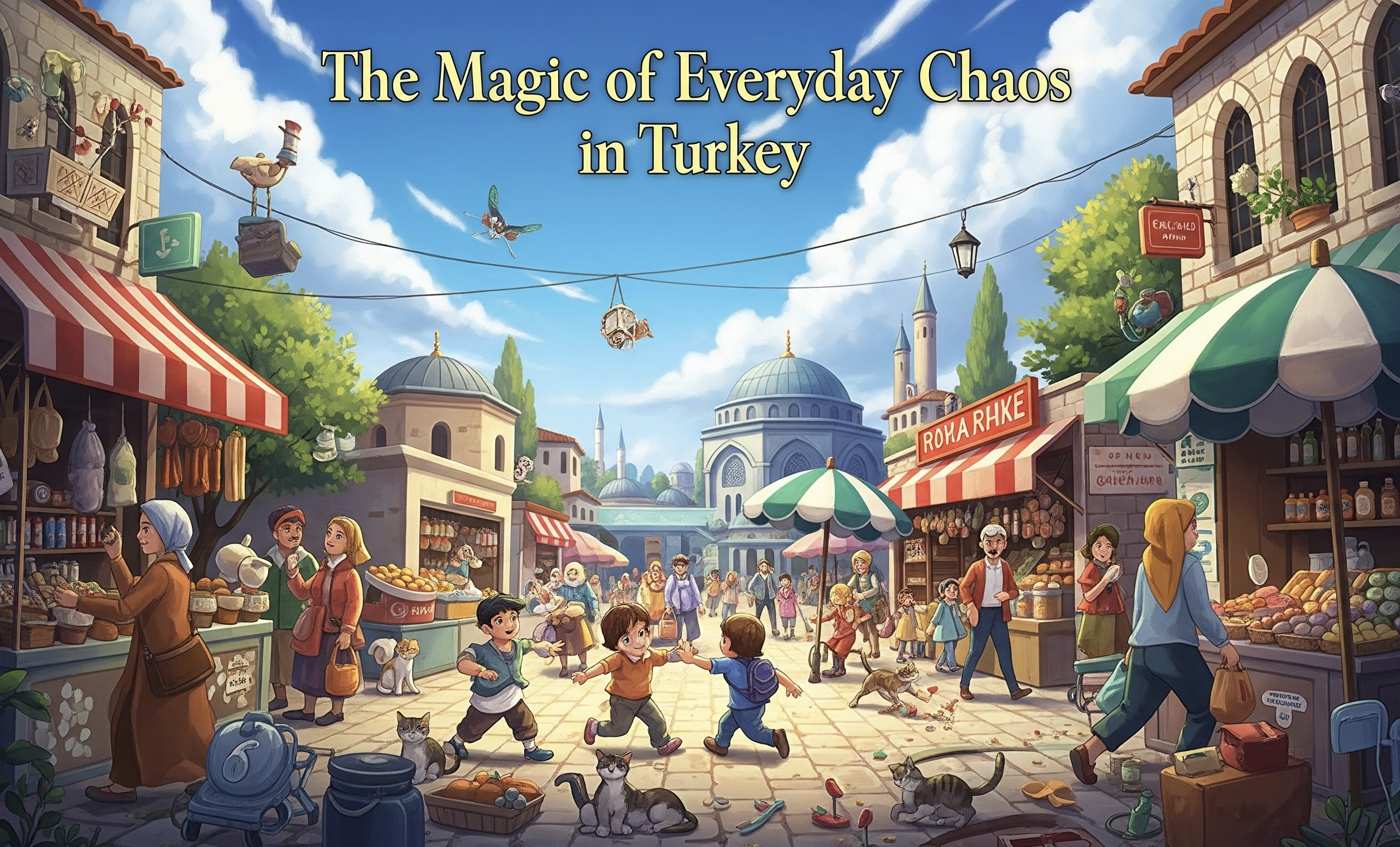
10. The Magic of Everyday Chaos
Turkey is not a country for strict plans. You may walk out the door intending to buy detergent and find yourself two hours later sipping tea in someone’s living room while watching a soap opera you don’t understand. And you’ll love every moment of it.
The Unexpected is Expected
Every day in Turkey contains surprises. A street might suddenly close for a festival you didn’t know was happening. Your neighbor might knock with a fresh-baked tray of börek “just because.” The power might go out, and everyone in the building will gather in the hallway for candles and gossip.
Don’t fight it. Embrace it. These are the moments you’ll remember.
Plans Are Suggestions
Try booking something for 9:00 a.m. sharp. It may happen at 9:30. Or 10. Or tomorrow. Turks are masters of “we’ll see” (bakalım) and “slow down” (yavaş yavaş).
You’ll find a rhythm in the chaos. Things get done — eventually. Bureaucracy takes patience. Deliveries arrive when they arrive. But in the end, problems are solved with flexibility, humor, and an uncanny ability to improvise.
You’re Never Alone in a Crisis
Flat tire? Strangers will pull over to help. Lost in the city? Someone will walk with you — possibly 10 blocks out of their way. Look confused? A dozen hands will point, gesture, and argue over how best to help you.
It’s chaotic. It’s beautiful. And it’s the heart of Turkey.
Spontaneity Rules
Some of your best days will come from last-minute invitations: a beach picnic, a village wedding, a countryside barbecue. Don’t say no — even if you don’t fully understand what’s happening. Pack a sweater, bring an appetite, and trust the journey.
Humor as a Lifeline
When plans fall apart, Turks laugh. When the power goes out, jokes fly. When bureaucracy turns surreal, you tell the story over tea.
Living in Turkey teaches resilience — not through hardship, but through community, kindness, and the joy of rolling with it.
So the next time your internet installer shows up two days late with a box of baklava and a cousin looking for an apartment — just smile and say, “Tamam.”
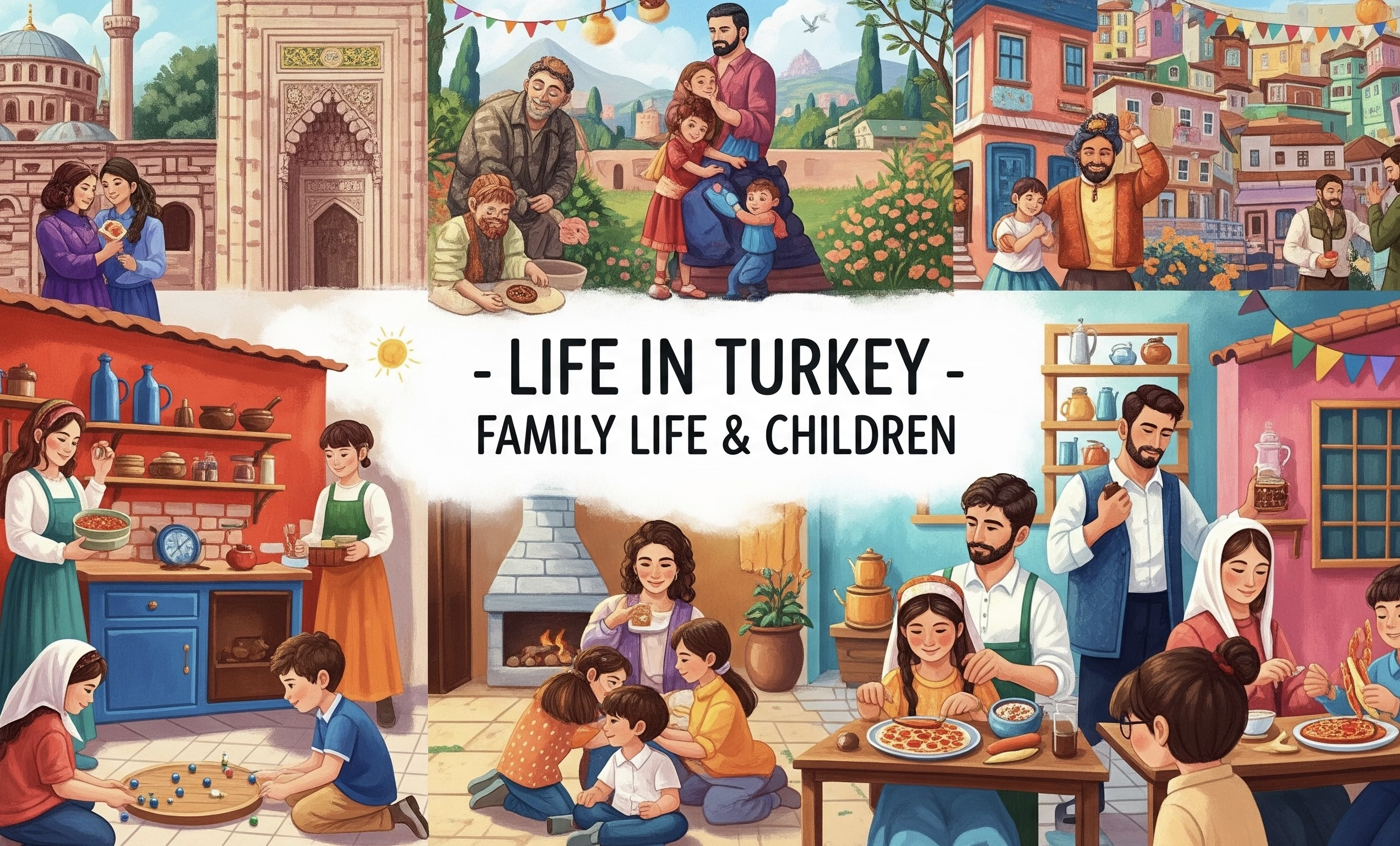
11. Family Life & Children
In Turkey, family isn’t just important — it’s everything. From daily decisions to national holidays, family plays a central role in shaping identity and daily rhythms.
Children as Royalty
Turkish society adores children. Whether you’re on a plane, in a restaurant, or walking down the street, expect strangers to smile, chat, and play peek-a-boo with little ones. Crying babies are rarely scolded — instead, someone nearby will try to help or distract them.
-
Kids stay up late (no strict 8 p.m. bedtimes here)
-
They receive free desserts at restaurants
-
Everyone — from waiters to taxi drivers — stops to admire them
Family Structures
Extended families often live close together or in multi-generational homes. Sundays are commonly reserved for family visits or elaborate meals. Birthdays, name days, circumcisions, and engagements are marked by noisy, joyful gatherings.
As a foreigner, you may be “adopted” by a Turkish family. Suddenly you have three new aunties, a grandmother offering you soup, and a “cousin” helping with your paperwork.
Parenting Style
Turkish parents are deeply protective and expressive. Hugs, kisses, and praise flow freely — as does discipline, when needed. And yes, you may be scolded by a stranger if your child isn’t wearing socks in winter.
Family isn’t just blood — it’s belonging.
12. Work and Business Culture
If you come from a rigid, hierarchical corporate world, Turkish business culture will feel refreshingly personal — or confusingly casual.
Formal but Flexible
Respect for titles and seniority is important. Yet relationships matter more than résumés. Trust is often built over meals, mutual contacts, and shared values — not just LinkedIn profiles.
Punctuality is appreciated, but meetings often start late and end with tea. Decisions may take longer due to consensus-driven dynamics or hierarchical approvals.
Entrepreneurial Spirit
Turkey is full of small businesses — from corner tailors to online sellers and bustling market stalls. The country thrives on hustle. People are resourceful and open to side gigs, and many expats start their own ventures too.
Expect:\n- Informality in emails\n- Face-to-face meetings over coffee\n- Endless phone calls (voice notes are common too)
If you’re polite, persistent, and open to conversation, you’ll go far.
13. Religion, Rituals & Respect
While Turkey is a secular republic, Islam deeply influences the rhythm of daily life. The call to prayer (ezan) rings out five times a day, reminding people of spiritual presence — even if not everyone practices regularly.
Living With Faith
Mosques are everywhere — from towering minarets to tiny corner prayer rooms. Fridays hold special religious significance, and during Ramadan, even secular people may fast or join in iftar (breaking the fast) meals.
Cultural Rituals
Beyond religion, you’ll witness rituals around:\n- Weddings (henna nights, wild dancing)\n- Baby blessings\n- New house ceremonies with sugar and salt for prosperity
During holidays like Eid, neighbors visit each other, kiss elders’ hands, and share sweets. You’ll likely be invited to participate — don’t hesitate.
Respecting Diversity
There’s space for varying beliefs: religious and secular Turks coexist, though sometimes with tension. As an expat, respect goes a long way. Dress modestly at sacred sites and be sensitive during prayer hours or fasting periods.
14. Weather, Seasons & Surprise Snowstorms
Turkey has four seasons — and sometimes all in one week, depending on the region.
-
Mediterranean Coast (Antalya, Izmir): Mild winters, hot summers
-
Central Anatolia (Ankara, Cappadocia): Cold, snowy winters; dry summers
-
Black Sea Region: Rainy and lush
-
Eastern Turkey: Frigid winters and alpine views
You’ll learn:\n- To layer your clothing
-
That air conditioning doubles as heating
-
Weather forecasts are often just polite guesses
Spring brings tulips, summer brings festivals, autumn brings pomegranates, and winter brings dramatic beauty — and chaos if snow hits Istanbul.
15. Shopping & Supermarkets
Shopping in Turkey is a mix of the old and the new.
Supermarkets
Chains like Migros, Şok, A101, and Carrefour dominate. Expect a whole aisle for yogurt, a surprisingly small cereal section, and an obsession with hazelnuts and olives.
-
Bring your own bags — plastic costs extra
-
Cashiers sit, not stand
-
Items are rarely scanned with urgency
Local Shops & Bakers
Neighborhoods have their own:\n- Greengrocer (manav)\n- Butcher (kasap)\n- Bakery (fırın)
Many are family-run, and they remember your name, your bread preference, and how you like your bananas.
Online Shopping
Trendyol, Hepsiburada, and Getir make next-day (or next-hour) delivery normal. Need socks at midnight? Done.

16. Healthcare: Modern, Affordable & Surprisingly Fast
Turkey’s healthcare system is one of the unsung expat perks.
-
Private hospitals are clean, modern, and surprisingly affordable
-
Public hospitals are accessible but may require patience
-
Pharmacies (eczane) can often diagnose and treat minor issues
Many doctors speak English. Appointments cost €10–€50. Dental work, vision care, and even cosmetic surgery are high-quality and much cheaper than in Western Europe or the U.S.
Also: pharmacists are treated almost like doctors — you can walk in with symptoms and leave with trusted advice and medicine.
17. Technology & Daily Convenience
Despite its ancient ruins and old-world charm, Turkey is tech-forward.
-
High-speed internet is cheap
-
QR code menus are everywhere
-
Bills, transport cards, and even neighborhood elections use apps
Apps like:\n- Getir (groceries in 15 minutes)\n- Yemeksepeti (food delivery)\n- e-Devlet (government portal) make daily life manageable
Turks are tech-savvy — expect your neighbor’s grandma to voice-message you on WhatsApp with emojis and stickers.
18. Cultural Curveballs & Faux Pas to Avoid
Here are a few things you’ll learn quickly:
-
Don’t point your feet at people
-
Don’t refuse food more than once
-
Don’t wear shoes indoors — ever
-
Don’t assume quiet means agreement
Also: asking “how much do you pay for rent?” isn’t rude — it’s conversation.
Turks are blunt, emotional, and incredibly warm. Misunderstandings happen, but humor, patience, and open-mindedness go a long way.
19. Festivals, Fireworks & Random Celebrations
Turkey knows how to celebrate — often loudly and with little warning.
Official Holidays
-
Republic Day (29 Oct) — flags, fireworks, parades
-
National Sovereignty Day (23 April) — for kids
-
Bayram Holidays — family feasts and sweet overload
Local Fun
You might stumble upon:\n- Cherry festivals\n- Village fairs with folk dancing\n- Outdoor film nights\n- Random weddings where you’re invited to dance
There’s always something happening. Follow the music.
20. Personal Growth & Unexpected Wisdom
Living in Turkey teaches you:\n- Patience (lines, paperwork, traffic)\n- Joy (music, food, kindness)\n- Letting go (plans rarely stay plans)\n- Humor (it’s the only way)
You’ll learn to trust strangers, try new things, and live with spontaneity. You’ll learn to love unpredictability.
And most of all, you’ll discover that what makes daily life in Turkey so special is how it always — always — manages to surprise you.
Final Thoughts: Life, Laughter, and a Little Chaos
Daily life in Turkey is like a Turkish breakfast: generous, colorful, and full of surprises you didn’t ask for but end up loving.
You might arrive looking for sunshine and history — but you’ll stay for the warmth in people’s eyes, the rhythm of unexpected laughter in a dolmuş, the smell of simit in the morning, and the way a stranger becomes family over a shared cup of tea.
Yes, it’s chaotic. Yes, it’s loud. Yes, sometimes the internet guy comes two days late with his cousin and a melon — but somehow, it works. And more than that: it grows on you.
You’ll leave your shoes at the door, your expectations at the border, and open your heart to a life that isn’t perfect — but is always alive.
“In Turkey, your tea’s never cold, your shoes come off at the door, and somehow lunch turns into a four-hour cultural experience.”
🌞 Dreaming of warm winters by the Mediterranean?
Thinking about spending your retirement in a sunny, healthy climate?
🏡 Looking to invest in safe, high-potential real estate — and earn solid rental income?
🌍 In today’s uncertain world, having a secure home abroad is more valuable than ever.
At Your Turkey Expert, we work with all major developers across Turkey and offer the widest selection of verified resale apartments and villas — always at the best possible price.
✅ Best Price Guarantee – on every property
✅ No service fee – ever
✅ Full after-sales support – from residence permits to furniture
✅ Honest, expert help – always tailored to your needs
Whether you’re retiring, relocating, or investing — we’re here to guide you every step of the way.
Let us help you find your place in the sun. ☀️
Contact us today – and take the first step toward your new life in Turkey.
🇹🇷 Retire, Invest, or Simply Enjoy Life in Turkey – We’ll Make It Easy
We’ll get back to you quickly — and a solution tailored just for you.

👋 Hi, I’m Urmas Saar. I personally respond to every message and I’ll make sure you get the help or property you’re looking for.
“Looking forward to hearing from you!”
— Urmas, Property Consultant at Expert Turkey
+372 5112 599 (WhatsApp)
